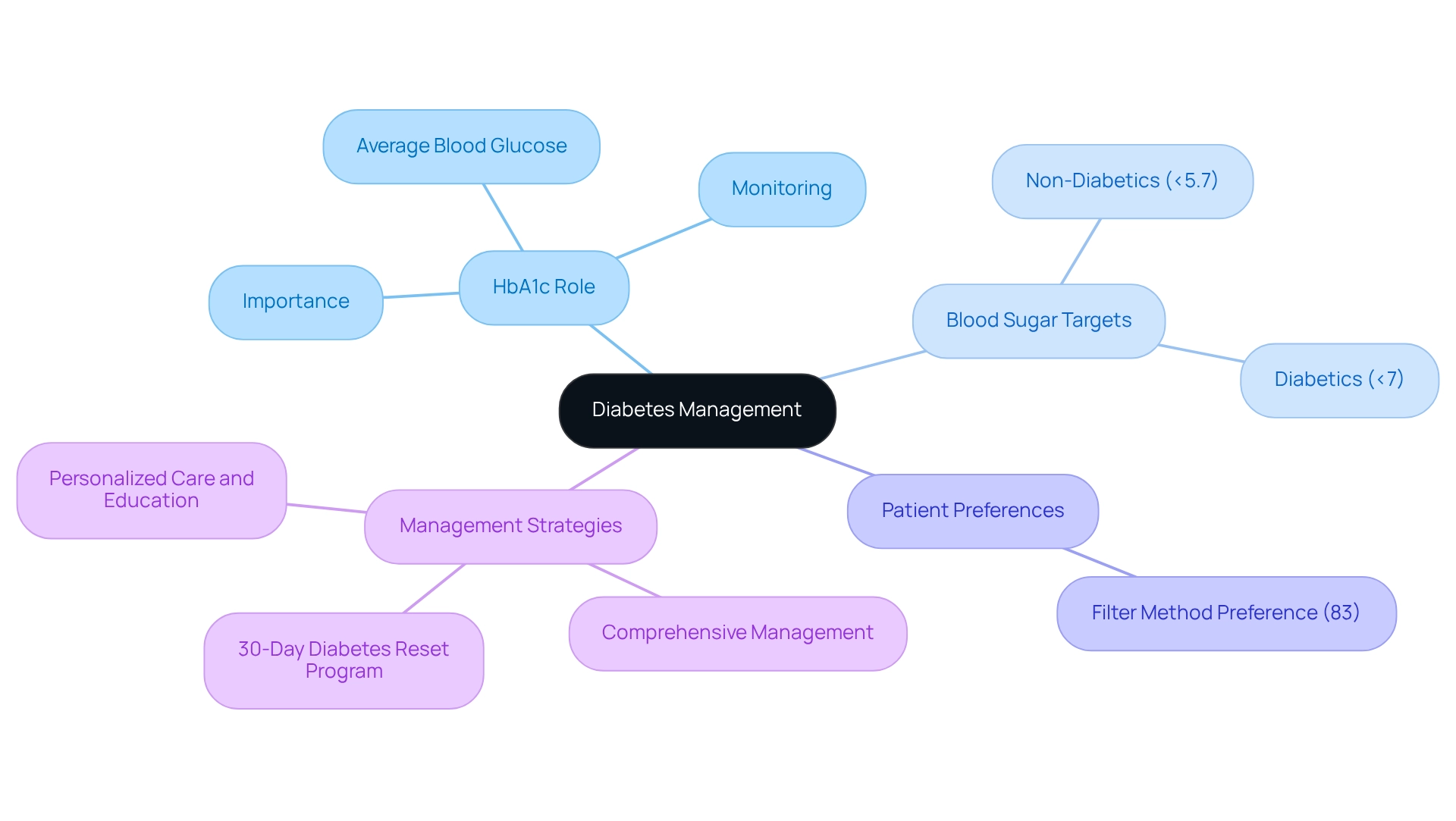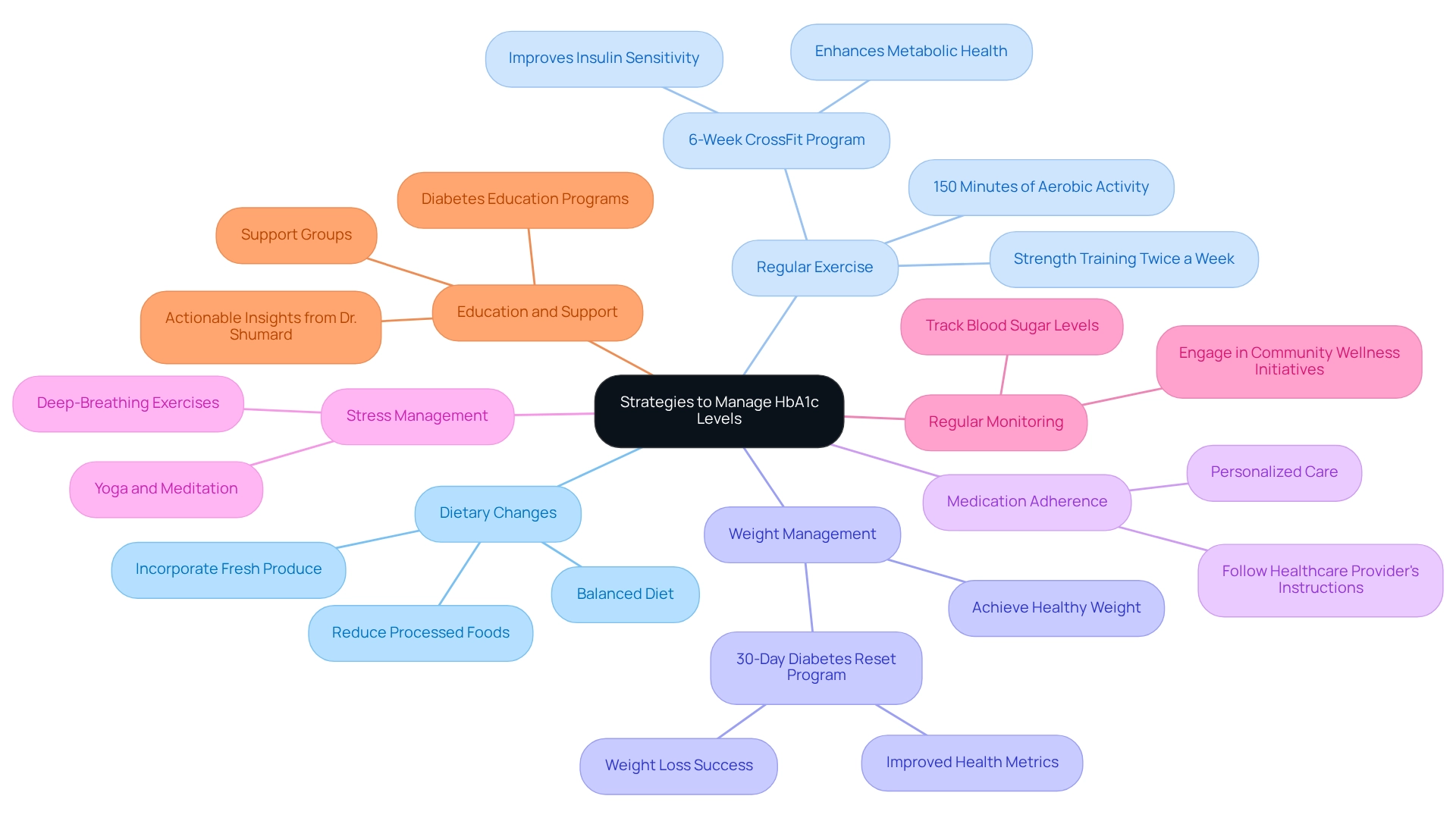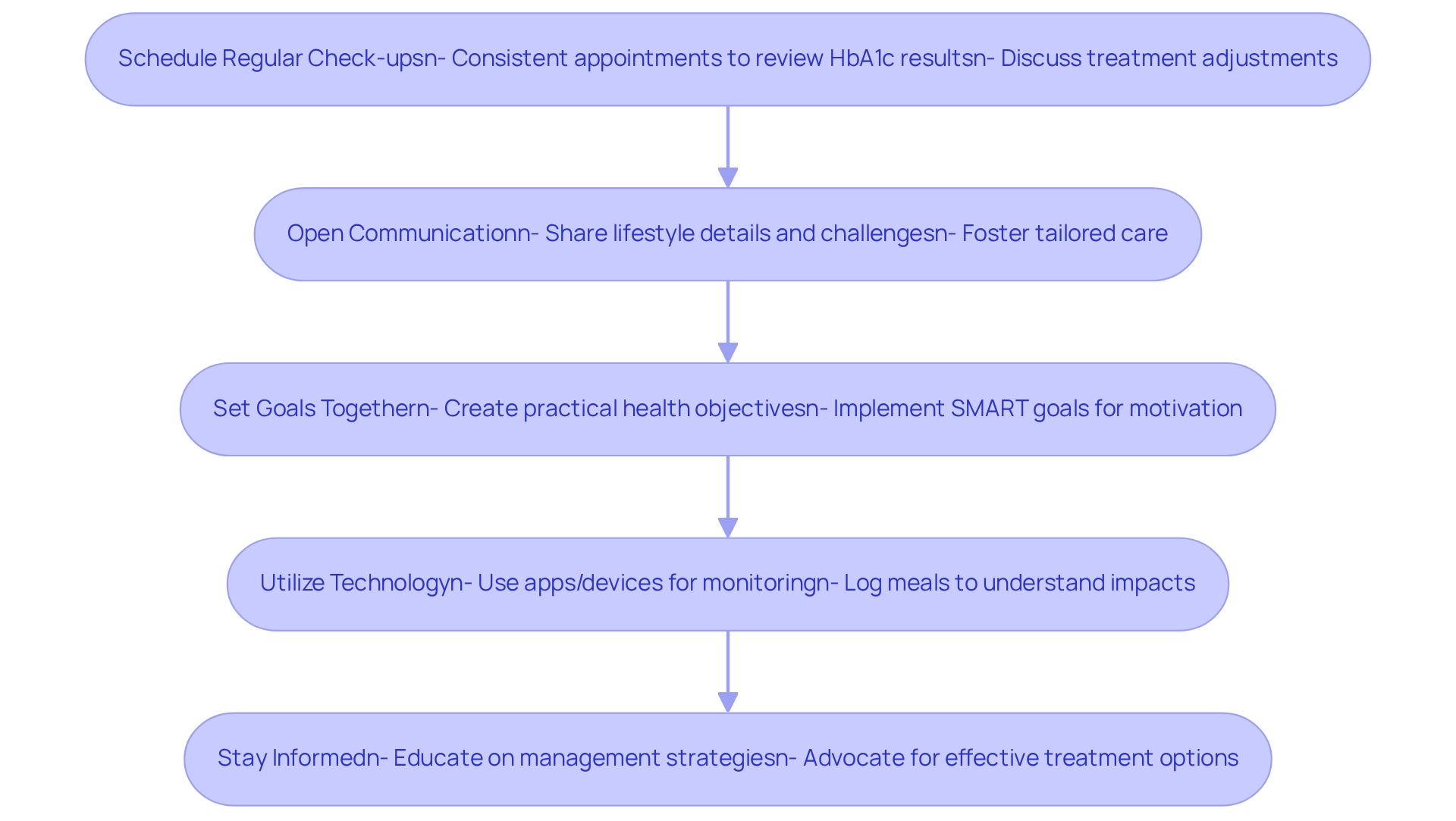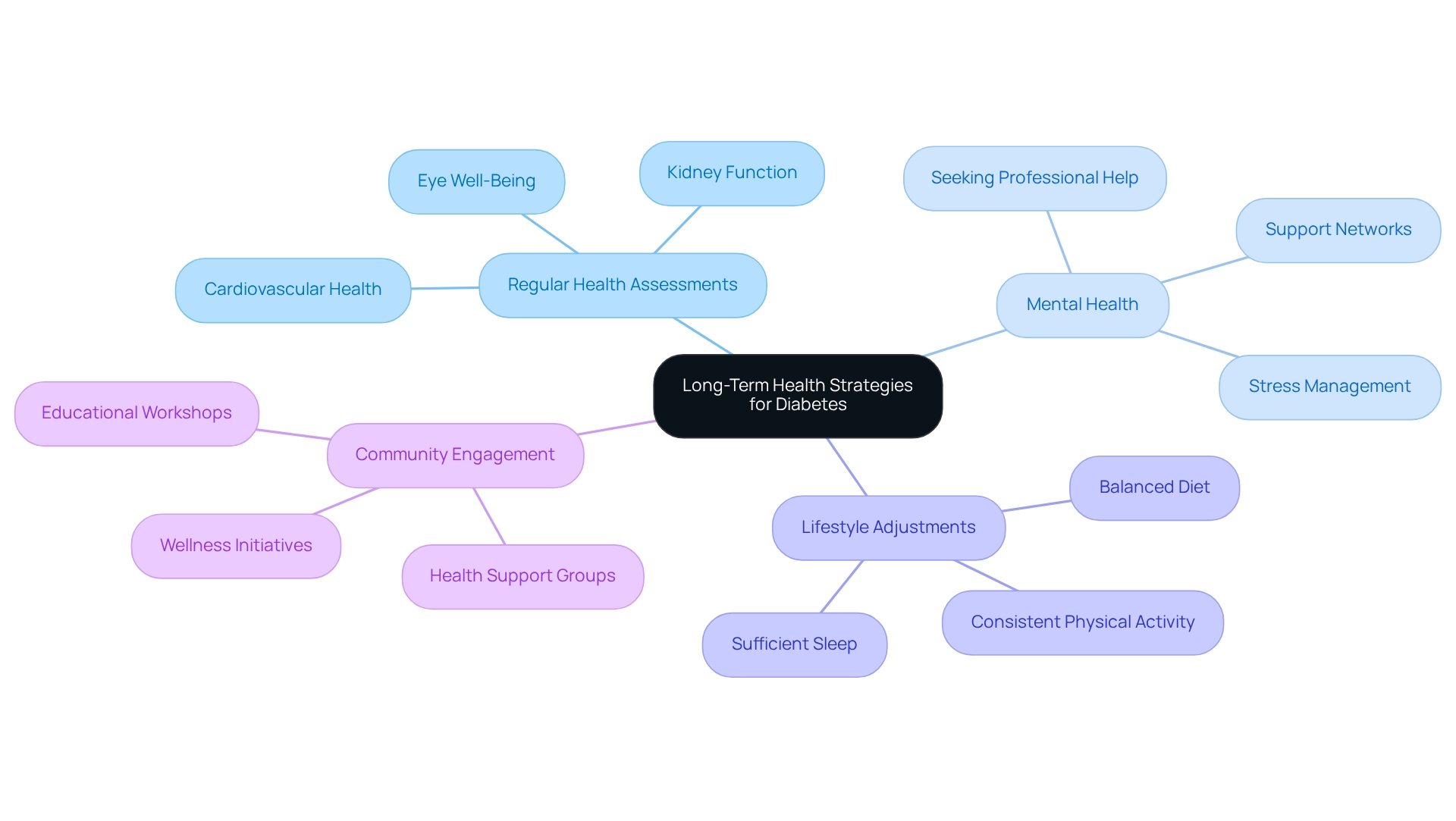Overview
Managing your HbA1c level of 5.4% is a significant achievement, reflecting effective blood glucose regulation and a non-prediabetic status. It’s important to recognize that maintaining this level requires a holistic approach. You might be wondering how to sustain this success in your daily life.
- Emphasizing dietary changes
- Regular exercise
- Weight management
These can make a real difference. Collaborating with healthcare providers is also crucial. Many patients find that proactive management not only prevents the onset of type 2 diabetes but also enhances their overall well-being. Remember, you’re not alone on this journey.
Consider the 30-Day Diabetes Reset program as a supportive step toward healthier living. It’s a chance to embrace positive changes and feel empowered in your health management.
Introduction
In the realm of diabetes management, it’s important to recognize the significance of HbA1c levels. This critical blood test acts as a barometer for average blood glucose levels over the previous months, helping to gauge the effectiveness of treatment strategies and the risk of complications. Many patients find that understanding these levels can be a source of both concern and empowerment. As the prevalence of diabetes continues to rise globally, with millions more expected to be diagnosed in the coming years, the urgency for effective management becomes increasingly clear.
This article delves into the nuances of HbA1c, exploring its implications for health and offering supportive guidance on strategies to maintain optimal levels. By collaborating with healthcare providers, individuals can take proactive steps toward reclaiming their health. Through a combination of dietary adjustments, exercise, and personalized care, many have found success in enhancing their quality of life in the face of this chronic condition. Together, we can navigate these challenges and work towards a healthier future.
Define HbA1c and Its Role in Diabetes Management
Glycated hemoglobin is a crucial blood test that assesses average blood glucose concentrations over the past two to three months. This metric is vital for evaluating the management of diabetes and understanding the risk of complications. Expressed as a percentage, a glycated hemoglobin measurement reflects the extent of blood sugar control; higher percentages indicate elevated blood sugar levels. For those without diabetes, a typical blood sugar measurement is below 5.7%. In contrast, individuals diagnosed with diabetes generally aim for a blood sugar level below 7%, although this target may vary based on personal health situations and treatment goals. It’s important to recognize that consistent monitoring of blood glucose levels is essential, as it allows healthcare professionals to tailor treatment strategies effectively, ensuring optimal sugar regulation.
Recent data highlights the growing importance of blood glucose monitoring in managing diabetes, especially as the number of individuals with this condition in Europe is projected to rise from 52 million to 69 million by 2035. This underscores the necessity for effective management strategies. Many patients find that research indicates 83% of participants preferred the filter method for HbA1c sampling, reflecting a shift towards more patient-friendly testing options. As Elizabeth Selvin, a professor in the Bloomberg School’s Department of Epidemiology, notes, understanding trends in blood sugar management is essential for enhancing patient outcomes.
Shumard’s method illustrates the effectiveness of addressing underlying causes of chronic conditions, as shown by case studies that highlight significant improvements in patients through comprehensive management strategies. For instance, those who participated in the 30-Day Diabetes Reset program reported not only better blood sugar control but also enhanced overall well-being. This innovative, clinically confirmed program supports thousands in stabilizing their glucose levels without relying on insulin or prescription medications, alleviating concerns about potential complications of diabetes. By focusing on personalized care and education, the Integrative Wellness Center empowers individuals to take charge of their health, ultimately leading to improved outcomes in diabetes management. This holistic approach is particularly relevant given the alarming statistics regarding hospital safety, such as the 7,000 incorrect medications administered to patients and 80,000 infections acquired in hospitals, emphasizing the need for safe and effective treatment options.
Interpret HbA1c 5.4: Health Implications and What It Means
A glycosylated hemoglobin level of HbA1c 5.4% is considered normal, indicating effective blood glucose regulation. It’s important to recognize that this measurement shows the individual is not in the prediabetic range, which begins at 5.7%. Sustaining a blood sugar level of HbA1c 5.4 is essential, as even slight rises can increase the risk of developing type 2 diabetes. Many patients find that understanding these numbers helps them feel more in control of their health.
The American Diabetes Association advocates for target values of HbA1c <7% (53 mmol/mol), emphasizing the significance of proactive wellness management. Individuals at this stage should actively monitor their blood sugar and adopt a healthy lifestyle to avert potential complications. Implementing effective strategies for progress tracking can significantly enhance focus and motivation in managing well-being. Consider utilizing:
- Fitness apps
- Journals
- Setting SMART goals—specific, measurable, attainable, relevant, and time-bound.
Regular consultations with healthcare providers are essential to ensure this optimal level is sustained. As Dr. Jason Shumard states, “By providing patients with actionable insights and practical tools, the center fosters an environment where individuals can reclaim their health and well-being.” This supportive approach can make a meaningful difference in your journey.
Moreover, continual investigation is essential to validate results and comprehend the mechanisms behind low blood sugar level associations. The case study titled “Patient Empowerment and Education” illustrates how Dr. Shumard emphasizes patient education, leading to positive outcomes for individuals managing their diabetes. Remember, you’re not alone in this journey, and there are resources available to help you thrive.
Implement Strategies to Manage and Lower HbA1c Levels
To effectively manage and lower HbA1c levels, it’s important to consider some supportive strategies that can make a real difference in your journey:
- Dietary Changes: Emphasizing a balanced diet rich in whole foods—like vegetables, lean proteins, and whole grains—can be transformative. Reducing processed foods and sugars is crucial for maintaining stable blood sugar levels. Dr. Jason Shumard’s approach at the Integrative Wellness Center highlights the importance of nutrition in reversing type 2 conditions, encouraging patients to incorporate fresh, local produce into their meals. Remember, every small change counts!
- Regular Exercise: Aim for at least 150 minutes of moderate aerobic activity each week, along with strength training exercises at least twice a week. Many patients find that participating in a 6-week CrossFit program can significantly enhance insulin sensitivity and improve overall metabolic health. Organized physical activity can lead to substantial improvements in blood glucose control. In San Marcos, CA, outdoor activities like hiking and walking can also align beautifully with your lifestyle.
- Weight Management: Achieving and maintaining a healthy weight is vital, as it can greatly influence blood sugar levels and result in an HbA1c 5.4 reading. Dr. Shumard’s 30-Day Diabetes Reset program has shown remarkable outcomes for patients, helping them lose weight and improve their overall well-being. Testimonials from participants often highlight significant improvements in their health metrics and overall happiness.
- Medication Adherence: It’s essential to follow your healthcare provider’s instructions regarding glucose medications to effectively manage your blood sugar. Dr. Shumard emphasizes personalized care, ensuring that each patient receives the attention necessary to manage their condition effectively.
- Stress Management: Incorporating stress-reducing practices like yoga, meditation, or deep-breathing exercises can be incredibly beneficial, as stress can negatively impact blood sugar regulation. The Integrative Wellness Center offers resources and support to help patients integrate mindfulness and relaxation techniques into their health management.
- Regular monitoring of your blood sugar levels can provide valuable insights into how your lifestyle choices affect your HbA1c 5.4 levels. Engaging in community wellness initiatives can offer additional support and resources tailored to effectively managing blood sugar levels.
- Education and Support: Participating in diabetes education programs and support groups, such as those offered by Dr. Jason Shumard’s center, can keep you informed and motivated. Engaging with these resources empowers you to make informed choices about your health. As Dr. Shumard states, “By providing patients with actionable insights and practical tools, the center fosters an environment where individuals can reclaim their health and well-being.”
Integrating these strategies can lead to notable improvements in blood glucose indicators. Multiple studies have showcased the positive impacts of dietary modifications and consistent physical activity on sugar regulation. Additionally, insights from case studies on resistance training interventions suggest that varying exercise protocols can further enhance management outcomes. For personalized guidance and support tailored to your unique needs, consider reaching out to Dr. Shumard or participating in upcoming events at the Integrative Wellness Center. You’re not alone in this journey, and support is always available.
Monitor Progress and Collaborate with Healthcare Providers
Tracking your blood sugar levels and collaborating with healthcare professionals is essential for effectively managing your condition. Let’s explore some key steps to consider:
-
Regular check-ups are vital to schedule consistent appointments with your healthcare provider to review your HbA1c 5.4 results and discuss any necessary adjustments to your treatment plan. Research shows that 44.8% of participants had poorly managed blood sugar levels, underscoring the importance of these check-ups for achieving better outcomes. Additionally, consider discussing the breakthrough processes for Type 2 patients that might offer new insights into your management strategy.
-
Open Communication: Sharing details about your lifestyle, challenges, and any wellness changes with your provider is crucial. Effective communication fosters a collaborative environment, allowing for tailored care that addresses your specific needs. It’s important to recognize that language barriers can influence this communication, potentially affecting your confidence in managing diabetes-related matters. For instance, if you find dietary changes challenging, discussing this openly can lead to more personalized advice.
-
Set Goals Together: Working with your healthcare team to create practical and attainable health objectives based on your blood sugar levels and overall well-being is essential. This partnership is vital for sustaining motivation and accountability on your health management journey. Dr. Jason Shumard’s approach emphasizes personalized care, enhancing the effectiveness of these goals. Implementing SMART goals—specific, measurable, attainable, relevant, and time-bound—can significantly boost your focus and motivation, ensuring that your goals are appropriately challenging yet achievable. For example, you might aim to reduce your levels to an HbA1c 5.4 by a certain percentage over the next three months.
-
Utilize Technology: Leverage blood sugar management applications or devices to monitor your glucose levels and gain insights into your progress. These tools can improve your understanding of how daily choices affect your well-being, empowering you to make informed decisions. For instance, using an app to log your meals can help you see how different foods impact your blood sugar levels.
-
Stay Informed: Educating yourself about blood sugar management strategies and the latest research findings is empowering. Knowledge enables you to make informed decisions about your health and engage more effectively with your healthcare team. Tailoring interventions based on your unique circumstances is vital for optimal outcomes. For example, understanding the implications of your HbA1c 5.4 levels can assist you in advocating for the most effective treatment options, and the significance of communication in managing blood sugar levels, particularly with an HbA1c 5.4, cannot be overstated. Research indicates that assurance in self-management of the condition is significantly influenced by effective communication between healthcare providers and patients. By nurturing a strong partnership with your healthcare provider, you can navigate the complexities of diabetes management more effectively, ultimately leading to a happier, healthier life.
Additional Considerations for Long-Term Health
Alongside managing hba1c 5.4 levels, it’s important to consider essential long-term wellness strategies that can make a significant difference in your journey:
- Regular Health Assessments: Staying current with evaluations for cardiovascular health, kidney function, and eye well-being is crucial. Diabetes can significantly increase the risk of complications in these areas, making proactive monitoring vital for early intervention. It’s important to recognize that regular check-ups can lead to timely support and better health outcomes.
- Mental Health: The psychological burden of managing a chronic illness can lead to increased stress, anxiety, or depression. Focusing on your mental well-being is essential; seeking assistance from mental health professionals or support networks can help you navigate these challenges effectively. Many patients find that addressing mental health greatly influences their blood sugar management results, highlighting the need to tackle both physical and emotional aspects of wellness.
- Lifestyle Adjustments: Embrace sustainable lifestyle changes that enhance your overall wellness. This includes a balanced diet rich in local produce, consistent physical activity through outdoor pursuits in San Marcos, and sufficient sleep. These practices not only aid in better blood sugar management but also improve your quality of life. Dr. Jason Shumard emphasizes that by providing patients with actionable insights and practical tools, the center fosters an environment where individuals can reclaim their wellness.
- Community Engagement: Actively participating in community resources such as local health support groups or educational workshops can be incredibly beneficial. Engaging with others who are facing similar challenges can offer encouragement, shared experiences, and valuable information to empower you on your wellness journey. For instance, attending workshops offered by Dr. Shumard’s center can connect you with others and provide insights into effective management strategies. Additionally, consider joining nearby wellness initiatives that focus on nutrition and fitness, which can offer tailored guidance suited to your needs.
Furthermore, reflect on the concerning statistic that there were 5,293 newly diagnosed cases of type 2 diabetes among children and adolescents aged 10 to 19 years in recent years. This highlights the urgency for early intervention and long-term health strategies to combat the rising incidence of diabetes. Remember, you are not alone in this journey, and taking proactive steps today can pave the way for a healthier tomorrow.
Conclusion
Maintaining optimal HbA1c levels is not just a medical goal; it’s a vital part of your journey toward better health. It’s important to recognize that understanding HbA1c as a reflection of your average blood glucose levels empowers you to take proactive steps in your health journey. Regular monitoring, open communication with your healthcare provider, and personalized strategies are essential components of effective diabetes care.
Many patients find that through dietary changes, regular exercise, weight management, and stress reduction techniques, they can significantly improve their HbA1c levels. This not only enhances their well-being but also reduces the risk of complications associated with diabetes. The evidence supporting the effectiveness of programs like the 30-Day Diabetes Reset highlights the potential for holistic approaches to yield positive health outcomes.
Moreover, addressing long-term health considerations, such as mental well-being and community engagement, reinforces the importance of a comprehensive approach to diabetes management. By fostering a strong partnership with your healthcare provider and leveraging available resources, you can navigate the complexities of diabetes with confidence. This journey ultimately leads to a healthier, more fulfilling life.
Prioritizing education, support, and sustainable lifestyle changes will pave the way for a brighter future in diabetes care. Remember, you are not alone in this journey, and every step you take is a step toward a healthier tomorrow.
Frequently Asked Questions
What is glycated hemoglobin and why is it important?
Glycated hemoglobin (HbA1c) is a blood test that measures average blood glucose concentrations over the past two to three months. It is vital for evaluating diabetes management and understanding the risk of complications.
How is glycated hemoglobin expressed and what do the percentages indicate?
Glycated hemoglobin is expressed as a percentage, reflecting the extent of blood sugar control. Higher percentages indicate elevated blood sugar levels.
What are the typical glycated hemoglobin levels for individuals without diabetes and those with diabetes?
For individuals without diabetes, a typical glycated hemoglobin level is below 5.7%. Those diagnosed with diabetes generally aim for a level below 7%, although this target may vary based on personal health situations and treatment goals.
Why is consistent monitoring of blood glucose levels essential?
Consistent monitoring allows healthcare professionals to tailor treatment strategies effectively, ensuring optimal sugar regulation and reducing the risk of complications.
What recent trends have been observed regarding blood glucose monitoring in diabetes management?
Recent data indicates a rising number of individuals with diabetes, projected to increase from 52 million to 69 million in Europe by 2035. Additionally, 83% of patients preferred the filter method for HbA1c sampling, reflecting a shift towards more patient-friendly testing options.
What is the 30-Day Diabetes Reset program, and what benefits does it offer?
The 30-Day Diabetes Reset program is a clinically confirmed initiative that helps individuals stabilize their glucose levels without relying on insulin or prescription medications. Participants reported better blood sugar control and enhanced overall well-being.
What role does patient education play in diabetes management?
Patient education is crucial for empowering individuals to take charge of their health, leading to improved outcomes in diabetes management. Understanding blood sugar trends helps patients feel more in control of their health.
What are the recommended target values for glycated hemoglobin according to the American Diabetes Association?
The American Diabetes Association recommends target values of HbA1c less than 7% (53 mmol/mol) for proactive wellness management.
How can individuals track their progress in managing diabetes?
Individuals can track their progress by using fitness apps, keeping journals, and setting SMART goals—specific, measurable, attainable, relevant, and time-bound.
Why is ongoing consultation with healthcare providers important for individuals managing diabetes?
Regular consultations with healthcare providers are essential to ensure that optimal blood sugar levels are maintained and to provide patients with actionable insights and practical tools for better health management.



